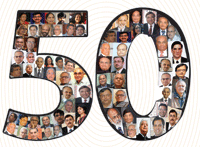 These are the best and worst times for India’s community of educationists and educators, principals and teachers included. On the positive side, perhaps more than ever before in the history of the Indian subcontinent, public interest in education and its life-sustaining social and private benefits is at its zenith. On the negative, there are the Central and state governments which like bulls in a china shop are running amok in Indian education interfering with private education institutions and piling on ill-conceived populist legislation which dilutes teaching-learning standards and learning outcomes in the country’s 1.26 million government schools, 80,000 private schools, 31,000 colleges and 611 universities. It is no exaggeration to state that at stake is the globally competitive capability and future of the next generation — 550 million children and youth enroled in India’s crumbling, rapidly obsolescing and dysfunctional institutions of primary, secondary, higher and vocational education.
These are the best and worst times for India’s community of educationists and educators, principals and teachers included. On the positive side, perhaps more than ever before in the history of the Indian subcontinent, public interest in education and its life-sustaining social and private benefits is at its zenith. On the negative, there are the Central and state governments which like bulls in a china shop are running amok in Indian education interfering with private education institutions and piling on ill-conceived populist legislation which dilutes teaching-learning standards and learning outcomes in the country’s 1.26 million government schools, 80,000 private schools, 31,000 colleges and 611 universities. It is no exaggeration to state that at stake is the globally competitive capability and future of the next generation — 550 million children and youth enroled in India’s crumbling, rapidly obsolescing and dysfunctional institutions of primary, secondary, higher and vocational education.
Against this sombre backdrop, heavy responsibility has devolved upon the country’s beleaguered minority of bona fide educationists and educators to positively influence public policy and simultaneously guide their own institutions of learning through treacherous waters and currents. This responsibility is not only of education philanthropists and private education entrepreneurs (‘edupreneurs’) who have “established and administer educational institutions of their choice” — a fundamental right conferred upon linguistic and religious minorities by the Constitution of India (Article 30 (1)) and expanded to all citizens in the Supreme Court’s landmark verdict in T.M.A Pai Foundation vs. State of Karnataka & Ors (2002) — but has also devolved upon vice chancellors, faculty and administrators of public universities, and principals and teachers of the country’s government schools. They need to practice leadership skills to nurture institutions under their care into centres of excellence and protect them from the populist leveling down efforts of rampaging politicians and bureaucrats.
Contrary to popular belief, such exemplary education leaders and visionaries are a growing minority within Indian education. After a hiatus of three years, EducationWorld presents thumbnail biographies of 50 education leaders who are struggling within a hostile regulatory environment to raise teaching-learning standards in India’s beleaguered preschool, school and higher education institutions.
Early promise belied
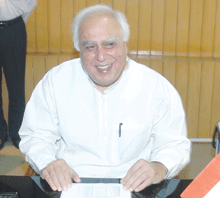 Kapil Sibal, Union minister of human resource development. A Harvard Law School alumnus and one of the country’s most successful Supreme Court lawyers of the famous Rs.50 crore per year income cabal, when the Congress-led United Progressive Alliance (UPA) coalition was returned to power in New Delhi in May 2009, Sibal was allocated the vitally important human resource portfolio to undo the damage done to India’s floundering education system by his predecessor, the late and unlamented Arjun Singh.
Kapil Sibal, Union minister of human resource development. A Harvard Law School alumnus and one of the country’s most successful Supreme Court lawyers of the famous Rs.50 crore per year income cabal, when the Congress-led United Progressive Alliance (UPA) coalition was returned to power in New Delhi in May 2009, Sibal was allocated the vitally important human resource portfolio to undo the damage done to India’s floundering education system by his predecessor, the late and unlamented Arjun Singh.
Unfortunately, since then the currents of Sibal’s education reform enterprises of great pith and moment have run awry and during the past two years, Sibal — hitherto the most prominent media spokesperson of the Congress party — has almost completely eroded the massive bank of goodwill that he had built up during his first year in office. Most of the hastily drafted legislation relating to reforms in higher education (National Commission for Higher Education and Research, Foreign Education Providers (Regulation of Entry and Operations) and Prohibition of Unfair Practices in Technical Education Institutions Bills among others) has been heavily criticised, even by Congress MPs, and stalled by the standing committee of the HRD ministry.
Perhaps the only saving grace of his stint as HRD minister has been the passage of the Right to Free and Compulsory Education (RTE) Act, 2009 through Parliament. But ab initio, this historic legislation which became law in 2010 has been mired in controversy. And although on April 12 in Society for Unaided Schools of Rajasthan vs. Union of India & Ors, in a split verdict the Supreme Court substantially upheld the constitutional validity of the RTE Act, it is becoming increasingly clear that having failed to even minimally reform the crumbling government school system, the Act represents Sibal’s last-ditch effort to transfer the burden of educating the children of the poor to privately promoted schools.
With his term in Shastri Bhavan drawing to a close, it is clear that like his predecessors in this high-potential office, Sibal hasn’t been able to make any significant headway in implementing overdue reforms in Indian education. His inclusion in this list of 50 great education leaders is ex officio rather than for any notable contribution to Indian education which continues to flounder in shallows and misery.
Rural education messiah
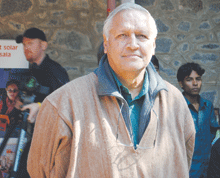 Sanjit (‘Bunker’) Roy, director Barefoot College, Tilonia. Although with 67 percent of its population resident in rural India, the nation lives in its villages, in the Soviet-style centrally planned Indian economy, the gap in education delivery — and therefore in standards of living — between rural and urban India has widened over the past six decades since the nation wrested its independence from British rule in 1947.
Sanjit (‘Bunker’) Roy, director Barefoot College, Tilonia. Although with 67 percent of its population resident in rural India, the nation lives in its villages, in the Soviet-style centrally planned Indian economy, the gap in education delivery — and therefore in standards of living — between rural and urban India has widened over the past six decades since the nation wrested its independence from British rule in 1947.
In the early 1960s, first-hand experience of a famine in rural Bihar aroused deep emotion within Roy, an alumnus of the blue-chip Doon School and St. Stephen’s College. Determined to address the development problems of rural India, in 1972 Roy established the Social Work and Research Centre (SWRC) in a hot and dusty rural tract in the desert state of Rajasthan. Since then, SWRC has metamorphosed into the Barefoot College (BC) which runs 714 night primary schools for 235,000 children in 673 villages in five states of the Indian Union, and transforms illiterate and quasi-literate peasants into competent (but deliberately uncertified) barefoot solar and water harvesting engineers, hand-pump mechanics, architects, blacksmiths and weavers.
Roy claims that Barefoot College is the sole education institution worldwide which “consciously follows the teaching, life and work style of Mahatma Gandhi who envisioned an India comprising thousands of self-sustaining village republics”.
Moreover in a global initiative BC has transformed over 225 rural women from 26 developing countries around the world into barefoot solar engineers under its GWBSE (grandmother women barefoot solar engineers) programme.
Yet unsurprisingly, BC is more renowned abroad than in India where there is strong adherence to the country’s teacher-centric education model. With the middle class and the media uninterested in rural India, the public is largely unaware of the unique Barefoot College rural development model which if scaled up has the potential to radically improve rural productivity and incomes to transform the Indian economy.
True-blue K-12 educator
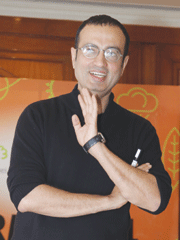 Ashish Rajpal, chief executive iDiscoveri Education. In 2001, Rajpal chucked up a by-all-accounts spectacular career assignment as the global marketing director of the Paris-based dairy products and Evian water vending multinational Groupe Danone (annual sales: Euro 19.3 billion or Rs.123,500 crore) and signed up as a student at the Harvard School of Education. The next year he returned to India and teamed up with some of his XLRI, Jamshedpur batchmates to promote iDiscoveri Education Pvt. Ltd. Since then iDiscoveri, which has assembled a highly-qualified team of 300 education professionals, has grown into India’s most progressive 21st century K-12 schools reform and development company providing a wide range of services including content, curriculum-based teacher training, institutional and leadership development advice to 850 schools with an aggregate enrolment of 400,000 children and 25,000 teachers.
Ashish Rajpal, chief executive iDiscoveri Education. In 2001, Rajpal chucked up a by-all-accounts spectacular career assignment as the global marketing director of the Paris-based dairy products and Evian water vending multinational Groupe Danone (annual sales: Euro 19.3 billion or Rs.123,500 crore) and signed up as a student at the Harvard School of Education. The next year he returned to India and teamed up with some of his XLRI, Jamshedpur batchmates to promote iDiscoveri Education Pvt. Ltd. Since then iDiscoveri, which has assembled a highly-qualified team of 300 education professionals, has grown into India’s most progressive 21st century K-12 schools reform and development company providing a wide range of services including content, curriculum-based teacher training, institutional and leadership development advice to 850 schools with an aggregate enrolment of 400,000 children and 25,000 teachers.
Although currently iDiscoveri has restricted the delivery of globally benchmarked curriculums and institutional development services to private schools, Rajpal is ready, willing and able to provide the company’s services to the country’s 1.26 million government schools as and when they “have more respect for their customers”.
Science education evangelist
Dr. C.N.R. Rao, chairman, Scientific Advisory Council to the prime minister and president, Jawaharlal Nehru Centre for Advanced Scientific Research, Bangalore. The country’s most high-profile scientist who seldom misses an opportunity to complain about the neglect of science education and development of the country’s research capability, Rao has repeatedly warned of the dangers of a growing number of arts, science and commerce colleges closing down their science faculties, and of neglect of research in the IITs which are “being converted into ordinary engineering colleges”. A frequent essayist of EducationWorld, in a widely appreciated recent column in this publication, Rao forthrightly called upon the Central and state governments to bite the bullet of raising university faculty remuneration several-fold to attract the best talent into academia as a “national priority”.
An alumnus of Mysore, Benares Hindu and Purdue universities, Rao began his career as professor of chemistry at IIT-Kanpur and rose within academia to the apex position of director of the prestigious Indian Institute of Science, Bangalore (1984-94). Currently, this indefatigable septuagenarian is visiting professor at Purdue, Oxford and Cambridge universities and widely acknowledged as one of the world’s foremost authorities on solid state and materials chemistry.
Tribal children champion
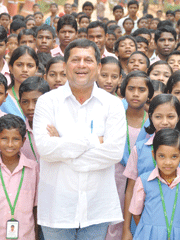 Dr. Achyuta Samanta, founder director of KIIT University and the Kalinga Institute of Social Sciences, Bhubaneswar (Odisha). Born in rural Odisha (formerly Orissa), Samanta experienced grinding poverty in his youth despite which he put himself through school and college graduating with a Masters in chemistry from Utkal University in 1987 and starting his career as a college lecturer.
Dr. Achyuta Samanta, founder director of KIIT University and the Kalinga Institute of Social Sciences, Bhubaneswar (Odisha). Born in rural Odisha (formerly Orissa), Samanta experienced grinding poverty in his youth despite which he put himself through school and college graduating with a Masters in chemistry from Utkal University in 1987 and starting his career as a college lecturer.
Starting with a capital of Rs.5,000, within the span of a mere 15 years, this deeply religious education entrepreneur has built two great institutions — the for-profit KIIT University comprising 23 colleges of professional education with an aggregate enrolment of 15,225 students, and the Kalinga Institute of Social Sciences (KISS), reportedly the world’s largest boarding school which provides free-of-charge K-12 and collegiate education to 15,000 children drawn from the state’s most backward tribal population. Under an ingenious cross-subsidisation model devised by Samanta, the surpluses of KIIT University — routinely ranked among the country’s Top 50 providers of professional education (engineering, medical, management etc) — are ploughed into KISS to fund the education and upkeep of children in the latter institution which has won unstinted praise from educators in India and abroad.
Having established KISS as a model institution for providing high-quality holistic education to India’s neglected tribal children, Samanta has set his sights on replicating KISS in eight tribal areas of Odisha and across eastern India. “Meaningfully educating and mainstreaming children from bottom-of-the-pyramid families is the best prescription for combating the Naxalite insurgency confronting the nation and raising the poor majority out of poverty,” says this visionary education leader (see EW April 2012 cover feature).
Primary education benefactor
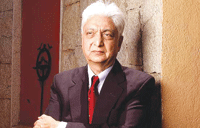 Azim Premji, promoter-chairman of Wipro Ltd, the Wipro Group of companies and Azim Premji University. Over three decades ago in the early seventies, Premji had to cut short his higher studies at Stanford University and return to India to take charge of the Mumbai-based Western India Vegetable Oil Products Co, which he diversified into the customised software business in the 1980s. This diversification paid off so mightily that Premji, who owns 84 percent equity of this publicly listed Bangalore-based IT major (sales revenue: Rs.35,000 crore; no. of employees: 135,000), has become one of the wealthiest individuals in India in terms of net worth.
Azim Premji, promoter-chairman of Wipro Ltd, the Wipro Group of companies and Azim Premji University. Over three decades ago in the early seventies, Premji had to cut short his higher studies at Stanford University and return to India to take charge of the Mumbai-based Western India Vegetable Oil Products Co, which he diversified into the customised software business in the 1980s. This diversification paid off so mightily that Premji, who owns 84 percent equity of this publicly listed Bangalore-based IT major (sales revenue: Rs.35,000 crore; no. of employees: 135,000), has become one of the wealthiest individuals in India in terms of net worth.
In the year 2000 he promoted the Azim Premji Foundation (APF) with the object of upgrading the quality of primary education in India, and the state of Karnataka in particular. After several years of insufficiently impactful forays into teacher training and content development for primary education, in 2010, Premji bit the bullet and made an irrevocable deed of gift to APF of a massive sum of Rs.8,846 crore for the construction and establishment of the Azim Premji University (APU) — the largest endowment for public education in Indian history.
The prime objective of APU is to set new standards in teacher training and research for school education. Sanctified by a special Azim Premji University Act, 2010 of the Karnataka Legislative Assembly, APU admitted its first batch of 150 students last July. Even as its state-of-the-art campus in Sarjapur in suburban Bangalore is taking shape, APU is set to change the primary education landscape in 21st century India by setting new standards in vitally important teacher training and development.
Co-curricular education pioneer
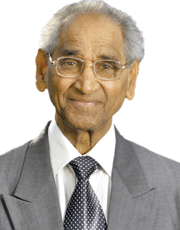 Dr. Jagdish Gandhi, founder-manager, City Montessori School, Lucknow. A graduate of Lucknow University, in 1959 Gandhi with his wife Bharti started a one-room school in Lucknow. That initiative has since morphed into the CISCE-affiliated City Montessori School (CMS), a K-12 private, independent school with the largest student enrolment in a single city (44,000 students spread over 20 campuses) — an institution building achievement acknowledged by Guinness World Records. CMS is also the only school worldwide to be awarded the UNESCO Prize for Peace Education (2002).
Dr. Jagdish Gandhi, founder-manager, City Montessori School, Lucknow. A graduate of Lucknow University, in 1959 Gandhi with his wife Bharti started a one-room school in Lucknow. That initiative has since morphed into the CISCE-affiliated City Montessori School (CMS), a K-12 private, independent school with the largest student enrolment in a single city (44,000 students spread over 20 campuses) — an institution building achievement acknowledged by Guinness World Records. CMS is also the only school worldwide to be awarded the UNESCO Prize for Peace Education (2002).
A distinguishing characteristic of CMS is its extraordinary emphasis on broad co-curricular education for teachers and students. The school hosts 32 international events on subjects ranging from astronomy to robotics annually and has an active student exchange programme with 20 schools overseas. It is also the first school in Uttar Pradesh to have installed an in-house FM radio network and uniquely, has hosted 12 international conferences of chief justices from around the world to discuss ways and means to build a safer world for children.
Although the septuagenarian Dr. Gandhi often draws flak for his aggressive use of the media to promote CMS, there’s no denying this pace setting and exemplary K-12 school, promoted 53 years ago, is highly regarded and respected. In the annual EW Survey of Schools 2011, CMS was ranked among the top 50 day schools countrywide, and among top three in Uttar Pradesh, the country’s most populous and educationally backward state.
UGC chairman
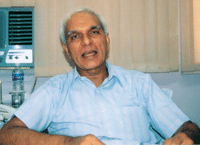
Prof. Ved Prakash, chairman of University Grants Commission (UGC), the country’s apex level funding and supervisory authority for higher (non-technical) education. Founder vice chancellor of the National University for Educational Planning and Administration (NUEPA), Delhi, a former director of NCERT, World Bank consultant, and hitherto secretary and vice-chairman of UGC, Prakash was appointed chairman of the council in February 2011.
With an annual budget of Rs.10,350 crore (2012-13), under the University Grants Commission Act, 1956 the commission has the discretion to confer development grants to the country’s 6,014 recognised (by UGC) colleges and Central and state universities. The commission is also vested with regulatory powers to enforce minimum standards of teaching, examination and research in non-technical colleges and universities countrywide.
An eminent academic and author of several books, articles and research papers on higher education, Prakash has helped UGC move beyond its funds disbursing function to evolve as a supervisory and monitoring organisation advising Central and state governments on measures necessary to improve higher education.
Budget schools defender
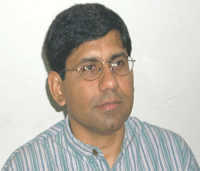 Dr. Parth Shah, president of the Centre for Civil Society (CCS), Delhi. An alumnus of Auburn University (USA) and former professor of economics at Michigan University, Shah promoted CCS in 1999. Since then, this NGO has transformed into one of the country’s top think-tanks for propagating liberal causes.
Dr. Parth Shah, president of the Centre for Civil Society (CCS), Delhi. An alumnus of Auburn University (USA) and former professor of economics at Michigan University, Shah promoted CCS in 1999. Since then, this NGO has transformed into one of the country’s top think-tanks for propagating liberal causes.
In the formulation of public policy related to education, this Delhi-based NGO, which has been sternly critical of poor quality education dispensed in the country’s government schools, has made valuable suggestions for systemic reform.
Moreover, under Shah’s leadership CCS has played a major role in propagating government-funded school vouchers which would permit the entry of children from socio-economically disadvantaged households into private schools of their choice. CCS has also emerged as a defender of promoters of private low-fees budget primaries sited in urban slums and villages which offer children from poor households an alternative to dysfunctional government schools characterised by crumbling infrastructure, chronic teacher absenteeism and poor learning outcomes.
Also the author of Law, Liberty and Livelihood (2005), which highlights the harassment of street vendors and citizens working in the informal sector of the economy by policemen and local government officials, Shah has helped CCS emerge as an intelligent and fearless protector of citizens’ economic rights and freedom.
Private professional colleges shepherd
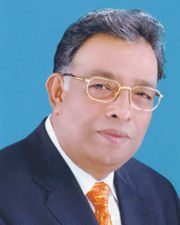 Dr. M.R. Jayaram, chairman, Consortium of Medical, Engineering and Dental Colleges-Karnataka (Comed-K) and Gokula Education Foundation (GEF), Bangalore. The Gokula Education Foundation manages the M.S. Ramaiah Group of 18 education institutions sited on a sprawling 65-acre campus in suburban Bangalore.
Dr. M.R. Jayaram, chairman, Consortium of Medical, Engineering and Dental Colleges-Karnataka (Comed-K) and Gokula Education Foundation (GEF), Bangalore. The Gokula Education Foundation manages the M.S. Ramaiah Group of 18 education institutions sited on a sprawling 65-acre campus in suburban Bangalore.
A commerce graduate of Bangalore University, in 2005 Jayaram was appointed chairman of Comed-K which currently has a membership of 157 engineering, 12 medical and 25 dental privately promoted colleges with an aggregate enrolment of 160,000 students in Karnataka. Following the Supreme Court’s landmark judgements in T.M.A. Pai Foundation vs. State of Karnataka & Ors (2002) and P.A. Inamdar (2005) cases, which permitted private colleges of professional education to administer their own collegiate entrance exams and levy reasonable tuition fees, an onerous responsibility to ‘voluntarily’ negotiate government quotas and fees with the state government has devolved upon Comed-K. Under Dr. Jayaram’s leadership, the consortium has successfully resisted arm-twisting by government and has repeatedly negotiated a fair deal for privately promoted colleges in the state.
Founded in 1962 by the late M.S. Ramaiah (1922-1997), a successful civil contractor, visionary, educationist, industrialist and philanthropist, GEF has promoted 18 education institutions (including a B-school, medical, dental, and engineering colleges) which provide Kg-Ph D level education to over 10,000 students.
Inclusive education diva
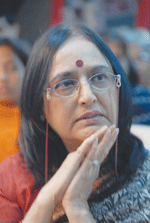 Dr. Mithu Alur, founder-chairperson Spastics Society of India (SSI) and the National Resource Centre for Inclusion (NRCI), Mumbai. An alumna of the London School of Economics with a Ph D awarded by London University, Alur who founded the Spastics Society in 1972 and the state-of-the-art National Resource Centre for Inclusion, Mumbai in 1999, is the celebrated champion of inclusive education for children with disabilities.
Dr. Mithu Alur, founder-chairperson Spastics Society of India (SSI) and the National Resource Centre for Inclusion (NRCI), Mumbai. An alumna of the London School of Economics with a Ph D awarded by London University, Alur who founded the Spastics Society in 1972 and the state-of-the-art National Resource Centre for Inclusion, Mumbai in 1999, is the celebrated champion of inclusive education for children with disabilities.
Apart from promoting SSI and NRCI which provide education to 3,000 physically and mentally challenged children, under the auspices of these two organisations, Alur has staged four global North-South conferences on inclusive education (i.e on ways and means to include challenged children into mainstream education) in Mumbai (2001), Kochi (2003), Delhi (2005) and Goa (2012).
According to Alur, currently 60 million differently abled children in India are denied education. As a result of her tireless efforts to champion the rights of challenged children, the Union government has accepted their inclusion into mainstream schools as a cardinal principle of its education policy. Therefore the Right to Free and Compulsory Education (RTE) Act, 2009 was amended by a special Amendment Act passed by Parliament in April 2012 to specifically include children with special needs within the category of poor neighbourhood children for whom the RTE Act reserves a 25 percent quota in class I of private unaided non-minority schools.
Cultural education doyenne
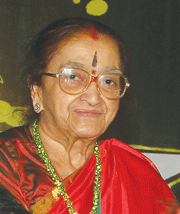 Dr. Y.G. Parthasarathy, dean and director, PSBB Schools, Chennai. A renowned teacher, administrator and patron of the arts and culture, octogenarian Y.G. Rajalakshmi Parthasarathy (popularly known as Dr. YGP) is a pioneer of progressive and culturally rooted education in Chennai. In 1958, YGP promoted Bala Bhavan, a school propagating Indian culture and values, with an enrolment of 13 students. This modest initiative has since grown into three pace-setting CBSE-affiliated Padma Seshadri Bala Bhavan (PSBB) schools in Chennai with 7,221 students instructed by 335 teachers.
Dr. Y.G. Parthasarathy, dean and director, PSBB Schools, Chennai. A renowned teacher, administrator and patron of the arts and culture, octogenarian Y.G. Rajalakshmi Parthasarathy (popularly known as Dr. YGP) is a pioneer of progressive and culturally rooted education in Chennai. In 1958, YGP promoted Bala Bhavan, a school propagating Indian culture and values, with an enrolment of 13 students. This modest initiative has since grown into three pace-setting CBSE-affiliated Padma Seshadri Bala Bhavan (PSBB) schools in Chennai with 7,221 students instructed by 335 teachers.
One of India’s first women journalists, who worked briefly in The Mail and The Hindu before she switched to education, Dr. YGP enroled for the B.Ed study programme of Mysore University at age 45. This was followed by an M.Ed and a Masters in history and a doctorate from Madras University. Since then under her enlightened leadership, PSBB schools have attained an excellent reputation for providing high-quality academic learning enriched by culturally-rooted co-curricular education. In the EducationWorld India’s Most Respected Schools Survey 2011, the flagship PSBB school was ranked third among the country’s Top 10 days schools and first in Chennai and south India.
In 2008 the PSBB School celebrated its golden jubilee year, and in collaboration with the Delhi-based ICT (information communications techno-logy)-in-schools heavyweight Educomp Solutions Ltd, Dr. YGP successfully launched the state-of-the-art, fully-wired PSBB Millennium School in Chennai. Currently, four PSBB Millennium schools have been established in peninsular India — two in Chennai, and one each in Bangalore and Coimbatore.
Transnational education providers
.gif) Dr. Ramdas Pai, chancellor, Manipal University, Dr. Ranjan Pai, chief executive and Anand Sudarshan, president of the Manipal Education Group (MEG). Since taking charge of MEG following the death of the legendary Dr. T.M.A. Pai (1889-1979) who pioneered the concept of self-financed, privately promoted institutions of professional education in India, Dr. Ramdas Pai has steered the growth and development of Manipal University (formerly MAHE) into India’s largest private provider of internationally acceptable medical, engineering and professional (nursing, pharmacy, business management, communications etc) education.
Dr. Ramdas Pai, chancellor, Manipal University, Dr. Ranjan Pai, chief executive and Anand Sudarshan, president of the Manipal Education Group (MEG). Since taking charge of MEG following the death of the legendary Dr. T.M.A. Pai (1889-1979) who pioneered the concept of self-financed, privately promoted institutions of professional education in India, Dr. Ramdas Pai has steered the growth and development of Manipal University (formerly MAHE) into India’s largest private provider of internationally acceptable medical, engineering and professional (nursing, pharmacy, business management, communications etc) education.
Certified India’s first multi-disciplinary, multi-campus deemed (private) university in 1993, MAHE officially transformed into Manipal University in 2006. Over the past half century, MEG (which includes Manipal University) has morphed into India’s first education transnational. At the invitation of the governments of Malaysia, Antigua, Nepal and Qatar, MEG has established state-of-the-art joint venture medical colleges-cum-teaching hospitals in these countries.
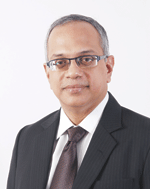 Today MEG comprises five universities and 40 institutions of education with an aggregate enrolment of 250,000 students instructed by a 2,000-strong faculty in India. Of this aggregate enrolment, 200,000 students spread over 55 countries are enroled in its Edunxt distance education programmes.
Today MEG comprises five universities and 40 institutions of education with an aggregate enrolment of 250,000 students instructed by a 2,000-strong faculty in India. Of this aggregate enrolment, 200,000 students spread over 55 countries are enroled in its Edunxt distance education programmes.
Moreover under Dr. Ranjan Pai and Anand Sudarshan, MEG has expanded to provide vocational skills education with the London-based City & Guilds; acquired majority equity stakes in the Singapore-based U21 Global (the world’s premier online business management university) and Merit Trac (India’s largest skills assessment company). Also rapidly assuming shape and form is a state-of-the-art Manipal University campus in suburban Bangalore exclusively for professional education of children of NRIs (non-resident Indians).
Preschool education pioneer
 Lina Ashar is the Mumbai-based founder-director of Kangaroo Kids Education Pvt. Ltd (KKEL), Mumbai. Educated in Africa, UK and Australia and an education alumna of Victoria College, Melbourne, Ashar began her career as a secondary school teacher in Australia in 1987. Four years later she relocated to India to promote KKEL.
Lina Ashar is the Mumbai-based founder-director of Kangaroo Kids Education Pvt. Ltd (KKEL), Mumbai. Educated in Africa, UK and Australia and an education alumna of Victoria College, Melbourne, Ashar began her career as a secondary school teacher in Australia in 1987. Four years later she relocated to India to promote KKEL.
Starting with one preschool in Bandra, Mumbai with a first batch of 13 children, Ashar has engineered the growth of KKEL across 24 cities in India, Dubai and the Maldives. Today the company provides its services to 55 Kangaroo Kids preschools and 18 Billabong High International schools run on the franchise model. KKEL has recruited, trained and nurtured a team of over 65 skilled and experienced educationists who design, develop and deliver curricula based on contemporary education research and pedagogies — apart from dispensing continuous in-service teacher training to its 73 franchised schools.
Over the past 18 years since she started her first preschool in Mumbai, Ashar has refined and enriched her education philosophy and pedagogies, which have beneficially impacted the neglected area of preschool education in particular, raising standards countrywide.
ICT-in-education innovator
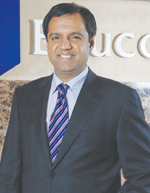 Shantanu Prakash, chairman and chief executive, Educomp Solutions Ltd (ESL). Innovator of the unique BOOT (build, own, operate and transfer) model to enable teachers and students across the country to utilise new ICT (information and communication technologies) to improve classroom teaching-learning outcomes, and for schools to painlessly become owners of sophisticated computer labs, Prakash has developed ESL into India’s most high-profile ICT-in education listed company which went public in 2006. An alumnus of the Shriram College of Commerce, Delhi and IIM-Ahmedabad, Prakash promoted the Delhi (Gurgaon)-based ESL in 1994 to serve the dormant needs of K-12 education. Currently ESL provides IT infrastructure, digitised curriculum and content, and teacher training services to 29,000 private and government schools countrywide, in which over 19 million students learn the Educomp SmartClass way by paying modest user fees of between Rs.80-150 per month.
Shantanu Prakash, chairman and chief executive, Educomp Solutions Ltd (ESL). Innovator of the unique BOOT (build, own, operate and transfer) model to enable teachers and students across the country to utilise new ICT (information and communication technologies) to improve classroom teaching-learning outcomes, and for schools to painlessly become owners of sophisticated computer labs, Prakash has developed ESL into India’s most high-profile ICT-in education listed company which went public in 2006. An alumnus of the Shriram College of Commerce, Delhi and IIM-Ahmedabad, Prakash promoted the Delhi (Gurgaon)-based ESL in 1994 to serve the dormant needs of K-12 education. Currently ESL provides IT infrastructure, digitised curriculum and content, and teacher training services to 29,000 private and government schools countrywide, in which over 19 million students learn the Educomp SmartClass way by paying modest user fees of between Rs.80-150 per month.
Since then, ESL has rapidly diversified its services and products mix signing an agreement with the Singapore-based Raffles Education Corporation, the largest education provision group in the Asia Pacific region, under which the two companies will introduce the entire suite of ESL’s products and services in China; promoted its Roots and Wings preschools division and its ‘Millennium’ K-12 schools. The company has also entered into a joint venture with the London-based Pearson Group to promote a chain of vocational education and training centres across the country.
Vocational education missionary
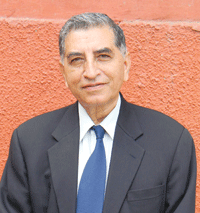 Krishan Khanna is the Mumbai-based founder-chairman iWatch Trust and i2k Solutions. An indefatigable champion of vocational education for almost two decades, in 1993 Khanna threw up a promising corporate career to start iWatch, a not-for-profit charitable trust to promote vocational education for school-leavers and dropouts. Since then, this mechanical engineering graduate of IIT-Kharagpur has consistently lobbied the cause of vocational education and training (VET) in New Delhi, Mumbai and within Indian industry through his monthly publication Transforming INDIA. As a result, the establishment has belatedly woken up to the importance of VET, hitherto a blindspot of Indian education.
Krishan Khanna is the Mumbai-based founder-chairman iWatch Trust and i2k Solutions. An indefatigable champion of vocational education for almost two decades, in 1993 Khanna threw up a promising corporate career to start iWatch, a not-for-profit charitable trust to promote vocational education for school-leavers and dropouts. Since then, this mechanical engineering graduate of IIT-Kharagpur has consistently lobbied the cause of vocational education and training (VET) in New Delhi, Mumbai and within Indian industry through his monthly publication Transforming INDIA. As a result, the establishment has belatedly woken up to the importance of VET, hitherto a blindspot of Indian education.
A promising outcome of Khanna’s persistent advocacy of VET is that heavyweight offshore providers of vocational education have begun low-profile operations in this country. Two London-based education behemoths — City and Guilds, which boasts the widest range of VET programmes worldwide and Pearson Plc, arguably the world’s largest education and publishing company — have linked up with the Manipal Education Group and the Delhi-based Educomp Solutions Ltd to promote India Skills and IndiaCan respectively, to dispense VET in India. Belatedly there’s new hope that widespread dissemination of VET will resolve India’s paradox of a massive pool of unemployed and an acute shortage of skilled technicians and workers.
Fast-track education entrepreneur
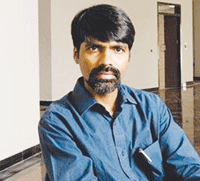 Satya Narayanan R, chairman, CL Educate Pvt. Ltd. An alumnus of St. Stephen’s College, Delhi and IIM-Bangalore, Narayanan quit a plum job at Ranbaxy Laboratories Ltd in 1995 at age 24, to start a tutorial centre in a small room in Delhi for B-school aspirants with an initial investment of Rs.3,600. Currently, Career Launcher (now CL Educate) runs 225 wholly-owned centres offering test preparatory tuition to 100,000 students writing a plethora of public entrance exams including CAT, GRE, GMAT, TOEFL, GATE, etc. With its 225 state-of-the-art fully-wired CL tutorial centres manned by 2,000 faculty (a majority of whom are IIM and IIT alumni) acknowledged as among the best in the country, in 2006 Narayanan diversified into the promotion of bricks-and-mortar education institutions including schools and colleges across India.
Satya Narayanan R, chairman, CL Educate Pvt. Ltd. An alumnus of St. Stephen’s College, Delhi and IIM-Bangalore, Narayanan quit a plum job at Ranbaxy Laboratories Ltd in 1995 at age 24, to start a tutorial centre in a small room in Delhi for B-school aspirants with an initial investment of Rs.3,600. Currently, Career Launcher (now CL Educate) runs 225 wholly-owned centres offering test preparatory tuition to 100,000 students writing a plethora of public entrance exams including CAT, GRE, GMAT, TOEFL, GATE, etc. With its 225 state-of-the-art fully-wired CL tutorial centres manned by 2,000 faculty (a majority of whom are IIM and IIT alumni) acknowledged as among the best in the country, in 2006 Narayanan diversified into the promotion of bricks-and-mortar education institutions including schools and colleges across India.
Since then, Narayanan has operationalised 22 fully-fledged K-12 schools branded Indus World School across the country with an aggregate enrolment of 10,000 students in eight states of the Indian Union. That’s not all. An Indus World School of Business in Noida on the outskirts of Delhi is fully operational (enrolment: 120 students) and has applied for deemed university status. Moreover, 35 vocational schools including ITIs, are being revamped under the public-private partnership model.
Also on Narayanan’s drawing board are 250 mid-market K-12 schools and a chain of low-cost schools over the next few years.
Divinely inspired edupreneurs
 Dr. Augustine & Mme Grace Pinto, chairman and managing director respectively of the Ryan International Group of Institutions (RIGI). An economics graduate of Loyola College, Chennai who began his professional career as an English language teacher in suburban Mumbai in 1983, Augustine Pinto (together with wife Grace) promoted their first KG-class V school in Mumbai with a few dozen students. Since then, within the span of a quarter century, they have nurtured and expanded RIGI into the country’s largest chain of 128 private sector wholly-owned K-12 schools with an aggregate enrolment of 250,000 students in 16 states of the Indian Union.
Dr. Augustine & Mme Grace Pinto, chairman and managing director respectively of the Ryan International Group of Institutions (RIGI). An economics graduate of Loyola College, Chennai who began his professional career as an English language teacher in suburban Mumbai in 1983, Augustine Pinto (together with wife Grace) promoted their first KG-class V school in Mumbai with a few dozen students. Since then, within the span of a quarter century, they have nurtured and expanded RIGI into the country’s largest chain of 128 private sector wholly-owned K-12 schools with an aggregate enrolment of 250,000 students in 16 states of the Indian Union.
Devout Christians, the Pintos attribute the rapid growth and development of RIGI into India’s largest school chain to divine inspiration and guidance. But evidently divine inspiration has been supplemented with determined and skillful institution development programmes. In the EW Survey of Schools 2011, Ryan International, Goregaon was ranked among the Top 10 day schools in Maharashtra and several RIGI schools were ranked among the Top 100.
Over the past three years, the RIGI management, which now includes heir apparent Ryan Pinto, a business management graduate of Warwick University, has continued to spread its operations across the country and has inaugurated eight new RIGI K-12 schools in India. Moreover, living up to its titular description, RIGI has recently promoted two CBSE-affiliated primary-secondaries in the Middle East (Gulf) countries. In addition, driven by a resurgent spirit of upgradation and innovation, the RIGI management is currently engaged in a massive organ-isation streamlining and restructuring exercise to improve teaching-learning standards and learning outcomes across the RIGI chain.
Powerhouse philanthropist
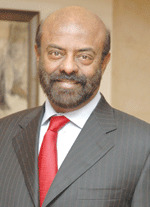 Shiv Nadar, promoter-chairman HCL Technologies and Shiv Nadar Foundation. An electrical and electronics engineering graduate of the PSG College of Engineering, Shiv Nadar is one of the early pioneers of India’s booming IT industry who co-founded Hindustan Computers Ltd in 1976 with an investment of Rs.1.87 lakh. Since then, the company renamed HCL Technologies Ltd which has diversified into over 40 subsidiaries, shifted its focus from manufacture of IT hardware to become a full-fledged software development and outsourced services corporation (revenue: Rs.16,034 crore in fiscal 2011-12). In 2007, Nadar stepped down from the role of chief executive of the company to work full-time with the Shiv Nadar Foundation.
Shiv Nadar, promoter-chairman HCL Technologies and Shiv Nadar Foundation. An electrical and electronics engineering graduate of the PSG College of Engineering, Shiv Nadar is one of the early pioneers of India’s booming IT industry who co-founded Hindustan Computers Ltd in 1976 with an investment of Rs.1.87 lakh. Since then, the company renamed HCL Technologies Ltd which has diversified into over 40 subsidiaries, shifted its focus from manufacture of IT hardware to become a full-fledged software development and outsourced services corporation (revenue: Rs.16,034 crore in fiscal 2011-12). In 2007, Nadar stepped down from the role of chief executive of the company to work full-time with the Shiv Nadar Foundation.
Since it was registered in 1994, the Shiv Nadar Foundation has promoted a Vidya Gyan primary school for rural children in Uttar Pradesh; the first of its proposed chain of state-of-the-art K-12 Shiv Nadar schools across the country; laid the foundation stone of its Shiv Nadar University on a 286-acre site in Delhi’s National Capital Region; promoted the SSN College of Engineering (1996), the SSN School of Management and Computer Applications, the SSN School of Advanced Software Engineering, Chennai, and the Kiran Nadar Museum of Art (estb. 2010). “The foundation’s focus on education evolved from my personal belief in education as the single most powerful tool for individual and social change…,” says Nadar.
Liberal face of Hindu nationalism
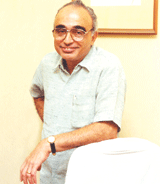
Homi N. Dastur, Mumbai-based executive secretary and director general Bharatiya Vidya Bhavan (BVB). An English literature and journalism postgraduate of Bombay University who signed up with BVB in 1963, this septuagenarian educationist has been closely involved with the Bhavan’s activities for almost half a century.
Founded by Kulapati K.M. Munshi on November 7, 1938 with the blessing of Mahatma Gandhi, Bharatiya Vidya Bhavan has steadily evolved into a nationwide intellectual, cultural and educational movement propagating the liberal and inclusive tenets of Indian — specifically Hindu — culture. During the past six decades, this essentially cultural organisation has promoted 92 schools, several arts, science and mass communications colleges, six business management institutes and 375 institutions and departments through its 125 centres across India and abroad. The aggregate student enrolment in BVB institutions is estimated at 300,000 and BVB’s print publications exceed 1,750 titles with aggregated sales of over 30 million.
The polar opposite of rabid right-wing and anti-minorities Hindu nationalism represented by the RSS and Vishwa Hindu Parishad, this values driven education and cultural organisation represents the acceptable face of majority nationalism, as envisioned by its founder K.M. Munshi (1887-1971).
Computer literacy pioneer
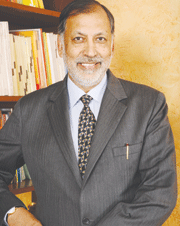 Rajendra Pawar, promoter-chairman of the Delhi/Gurgaon-headquartered NIIT Ltd (revenue: Rs.1,576 crore in the year ended March 31, 2012). Promoted as a software development and ICT (information and communications technology) company by Pawar, Vijay Thadani and P. Rajendran, batchmates at IIT-Delhi in 1981, over the past 31 years NIIT has metamorphosed into “Asia’s No. 1. IT training company and leading global talent development corporation”. Most strikingly, NIIT which has 3,850 employees worldwide, delivers IT training programs and services, not only in India, but in 40 countries including the neighbouring People’s Republic of China, where it has established 192 owned and franchised NIIT Learning Centres in 24 provinces. These centres offer Mandarin-language computer training and English learning programs to “millions of students” in that country.
Rajendra Pawar, promoter-chairman of the Delhi/Gurgaon-headquartered NIIT Ltd (revenue: Rs.1,576 crore in the year ended March 31, 2012). Promoted as a software development and ICT (information and communications technology) company by Pawar, Vijay Thadani and P. Rajendran, batchmates at IIT-Delhi in 1981, over the past 31 years NIIT has metamorphosed into “Asia’s No. 1. IT training company and leading global talent development corporation”. Most strikingly, NIIT which has 3,850 employees worldwide, delivers IT training programs and services, not only in India, but in 40 countries including the neighbouring People’s Republic of China, where it has established 192 owned and franchised NIIT Learning Centres in 24 provinces. These centres offer Mandarin-language computer training and English learning programs to “millions of students” in that country.
Short-term IT training programmes for youth and business executives apart, NIIT’s school learning solutions division offers computer training and curriculum-mapped multimedia learning services to 7,800 government primary/secondary and 1,200 private K-12 schools in 15 states countrywide.
Indeed it’s not an exaggeration to state that by spreading computer literacy NIIT has played a major role in the emergence of India’s IT industry as a significant player in the global IT and ICT sectors. And NIIT’s latest contribution to Indian education — Pawar’s brainchild — is the state-of-the-art NIIT University sited on a 100-acre campus in the fortress town of Neemrana, Rajasthan which offers engineering and business management education to 400 students.
New NCERT head
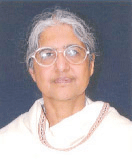
Prof. Parvin Sinclair, director of the National Council of Educational Research & Training (NCERT). An alumna of IIT-Kanpur and Tata Institute of Fundamental Research (TIFR), Mumbai, Prof. Sinclair acquired three decades of academic and teaching experience with TIFR and IGNOU, Delhi before taking charge as director of NCERT in January this year.
NCERT (estb.1961) is an apex level organisation which advises the Central and state governments on all matters related to school education. Its National Curriculum Framework for School Education 2005 is widely acknowledged as an excellent template for Central and state school education boards to adapt and follow. NCERT is also the country’s largest school texts publisher, and the council has often courted controversy for allegedly being used by incumbent governments in New Delhi to inject their ideologies in textbooks published by it.
A low-profile but well-respected mathematician and academic who has designed and developed several certificate programmes for school teachers as well as written school textbooks, Sinclair has reportedly short-listed development and renewal of curricula and instructional materials, and developing contemporary textbooks and teacher training programmes as her priorities.
Private schools defender
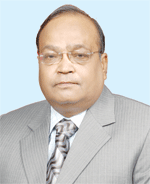 Damodar Goyal, president of the Society for Private Unaided Schools of Rajasthan which comprises 108 primary-secondary schools in the state. Following the legislation and unanimous enactment of the Right to Free and Compulsory Education (RTE) Act, 2009 by Parliament and its promulgation into law on April 1, 2010, Goyal has been in the forefront of the agitation against several provisions of the RTE Act which he believes severely threaten the constitutional guarantees conferred upon minorities — and expanded to include all citizens by the Supreme Court’s historic verdicts in the T.M.A Pai Foundation vs. State of Karnataka (2002) and P.A. Inamdar vs. State of Maharashtra (2005) cases. By these full-bench verdicts, the apex court held that all citizens have a fundamental right to be engaged in the ‘occupation’ of education provision without government micromanagement of privately-promoted institutions of education which haven’t or don’t receive any government aid or largesse.
Damodar Goyal, president of the Society for Private Unaided Schools of Rajasthan which comprises 108 primary-secondary schools in the state. Following the legislation and unanimous enactment of the Right to Free and Compulsory Education (RTE) Act, 2009 by Parliament and its promulgation into law on April 1, 2010, Goyal has been in the forefront of the agitation against several provisions of the RTE Act which he believes severely threaten the constitutional guarantees conferred upon minorities — and expanded to include all citizens by the Supreme Court’s historic verdicts in the T.M.A Pai Foundation vs. State of Karnataka (2002) and P.A. Inamdar vs. State of Maharashtra (2005) cases. By these full-bench verdicts, the apex court held that all citizens have a fundamental right to be engaged in the ‘occupation’ of education provision without government micromanagement of privately-promoted institutions of education which haven’t or don’t receive any government aid or largesse.
Goyal believes s. 12 (1) (c) of the RTE Act, which makes it compulsory for all private schools to admit 25 percent poor neighbourhood children, is in contravention of Article 30 (1) and Article 19 (1) (g) as interpreted by the T.M.A. Pai Foundation and P.A. Inamdar judgments of the apex court. The Society for Unaided Schools challenged the Act and s. 12 (1) (c) in particular by way of a writ petition No. 95 of 2010. However, in a controversial 2-1 majority verdict delivered on April 12, the Supreme Court substantially upheld the RTE Act, but exempted unaided minority and boarding schools from the ambit of s. 12 (1) (c). Convinced that the important principle of the autonomy of privately-promoted education institutions is involved, Goyal has reportedly filed a curative petition in the Supreme Court praying for the society’s writ petition to be adjudicated by a larger bench of the apex court.
School education expert
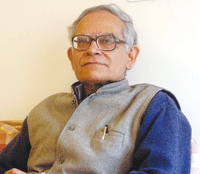 Dr. Krishna Kumar, professor of education, Delhi University. An alumnus of Sagar University, awarded a doctorate by the University of Toronto, and nationally-reputed as an authority on foundational school education, Prof. Krishna Kumar was appointed chairman of the National Council of Educational Research & Training (NCERT) — the country’s apex level curriculum setting and K-12 textbooks publishing organisation — by the Congress-led UPA-I government immediately after it assumed office in May 2004. In his first term at NCERT, Kumar successfully excised most of the right-wing Hindu propaganda and mythology injected by the BJP-led NDA government (1999-2004) from NCERT social science textbooks. Moreover, during his six years in office he conceptualised and wrote the National Curriculum Frame-work for School Education (NCFSE) 2005, widely appreciated as perhaps the best ever blueprint of secular, liberal and holistic education for primary-secondary schools and examination boards.
Dr. Krishna Kumar, professor of education, Delhi University. An alumnus of Sagar University, awarded a doctorate by the University of Toronto, and nationally-reputed as an authority on foundational school education, Prof. Krishna Kumar was appointed chairman of the National Council of Educational Research & Training (NCERT) — the country’s apex level curriculum setting and K-12 textbooks publishing organisation — by the Congress-led UPA-I government immediately after it assumed office in May 2004. In his first term at NCERT, Kumar successfully excised most of the right-wing Hindu propaganda and mythology injected by the BJP-led NDA government (1999-2004) from NCERT social science textbooks. Moreover, during his six years in office he conceptualised and wrote the National Curriculum Frame-work for School Education (NCFSE) 2005, widely appreciated as perhaps the best ever blueprint of secular, liberal and holistic education for primary-secondary schools and examination boards.
When the Congress-led UPA-II government was returned to power in 2009, Dr. Kumar was retained as chairman of NCERT and appointed a member of Congress party president Sonia Gandhi’s National Advisory Council with a special brief to advise on the implementation of the landmark Right to Free and Compulsory Education (RTE) Act, 2009. However, reportedly disillusioned with the failure of the Central and state governments to implement NCFSE and RTE legislation with sufficient enthusiasm, in 2010 Dr. Kumar put in his papers at NCERT and returned to the faculty of education at Delhi University.
New CISCE board chief
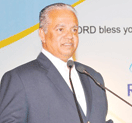 Rev. Jose Aikara, chairman Council for Indian School Certificate Examinations (CISCE). A botany postgraduate of Madras Christian College, Chennai, founder principal of De Paul School, Berhampur, Orissa (1987-2000) and currently founder principal of De Paul International Residential School and College, Mysore (estb. 2003), Aikara was elected chairman of the pan-India CISCE examination board in March this year. The Delhi-based CISCE is a wholly autonomous organisation which has 1,800 of the country’s top-ranked private schools including The Doon School, Dehradun; The Shri Ram School, Delhi; Cathedral & John Connon School, Mumbai among others affiliated with it. An estimated 191,000 students countrywide write its annual class X (ICSE) and class XII (ISC) exams.
Rev. Jose Aikara, chairman Council for Indian School Certificate Examinations (CISCE). A botany postgraduate of Madras Christian College, Chennai, founder principal of De Paul School, Berhampur, Orissa (1987-2000) and currently founder principal of De Paul International Residential School and College, Mysore (estb. 2003), Aikara was elected chairman of the pan-India CISCE examination board in March this year. The Delhi-based CISCE is a wholly autonomous organisation which has 1,800 of the country’s top-ranked private schools including The Doon School, Dehradun; The Shri Ram School, Delhi; Cathedral & John Connon School, Mumbai among others affiliated with it. An estimated 191,000 students countrywide write its annual class X (ICSE) and class XII (ISC) exams.
Though Aikara’s election to the top post in CICSE was mired in controversy with some associations of CISCE schools strongly opposing his appointment, he succeeded in convincing a majority of the 52-member board to elect him the first non-Anglo Indian chairman of the council (estb. 1958). In the top job for barely three months, Aikara has publicly committed to embarking on a curriculum upgradation drive and introducing new supplementary courses to ensure CICSE retains its position as India’s most preferred school-leaving examinations board.
Amity Group’s can-do family
 Dr. Ashok Chauhan, promoter-chairman Amity Group of education institutions. A science graduate of Agra University who won a scholarship to study chemical engineering at Wurzburg University in then West Germany in 1966, Chauhan tarried in Germany to transform into the most successful businessman of Indian origin in continental Europe as the founder-chairman of the AKC Group of companies. In the early 1990s after the fall of the Berlin Wall and the reunification of Germany, Dr. Chauhan reverse migrated to India to focus on the activities of the Ritnand Balved Trust (estb.1986) and the growth of the Amity Group of institutions in India.
Dr. Ashok Chauhan, promoter-chairman Amity Group of education institutions. A science graduate of Agra University who won a scholarship to study chemical engineering at Wurzburg University in then West Germany in 1966, Chauhan tarried in Germany to transform into the most successful businessman of Indian origin in continental Europe as the founder-chairman of the AKC Group of companies. In the early 1990s after the fall of the Berlin Wall and the reunification of Germany, Dr. Chauhan reverse migrated to India to focus on the activities of the Ritnand Balved Trust (estb.1986) and the growth of the Amity Group of institutions in India.
Since then the Amity Group’s K-12 and higher education institutions have multiplied with unprecedented speed and purpose under the care and management of Dr. Chauhan and his wife Dr. Amita Chauhan and London School of Economics and Wharton Business School educated sons Atul and Aseem. Today the Amity Group comprises five universities, 17 primary-secondary schools and 150 other institutions of education with an aggregate enrolment of 95,000 students and 3,500 faculty spread over 17 campuses in India and seven abroad. These highly rated institutions include the state-of-the-art Amity University, Noida (aggregate enrolment: 35,000) managed by Atul Chauhan and Amity University, Rajasthan (5,000 students) by Aseem Chauhan.
Determined to provide Indian students with globally comparable undergrad and postgraduate professional (engineering, business management, biotech etc) education at Indian prices as well as global exposure, Amity University has established seven campuses abroad and according to Dr. Chauhan has drawn up plans to establish Amity campuses in 25 countries worldwide.
Education behemoth CEO
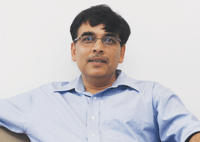 Ranu Kawatra, president and chief executive of Pearson Education (India). The London-based Pearson Plc (aka Pearson Group) is arguably the world’s largest and most diversified education and publishing conglomerate (revenue: £5.9 billion or Rs.50,740 crore in 2011), and has a diverse business mix comprising textbooks publishing, digital learning, online testing and assessment, bricks-n-mortar institutions and online and vocational education. The company maintained a low profile in India until January last year when it invested a massive $127 million (then Rs.577 crore) to acquire a 76 percent equity stake in the Bangalore-based Tutor Vista Pvt. Ltd. Since then, Pearson Education — the major business division of the Pearson Group — has rolled out its products and services in India with rapid speed.
Ranu Kawatra, president and chief executive of Pearson Education (India). The London-based Pearson Plc (aka Pearson Group) is arguably the world’s largest and most diversified education and publishing conglomerate (revenue: £5.9 billion or Rs.50,740 crore in 2011), and has a diverse business mix comprising textbooks publishing, digital learning, online testing and assessment, bricks-n-mortar institutions and online and vocational education. The company maintained a low profile in India until January last year when it invested a massive $127 million (then Rs.577 crore) to acquire a 76 percent equity stake in the Bangalore-based Tutor Vista Pvt. Ltd. Since then, Pearson Education — the major business division of the Pearson Group — has rolled out its products and services in India with rapid speed.
Among the major business verticals of Pearson Education which are already operational in India are Pearson Vue (which provides online testing services to clients under controlled conditions in its test centres); Pearson Clinical and Talent Assessment (psychological and cognitive evaluation); Tutor Vista (online tutoring); Pearson Test of English — Academic (English language testing); Pearson K-12 (primary- secondary education); and vocational education (IndiaCan, a joint venture with Educomp Solutions Ltd, Delhi); Edexcel (school leaving examinations and certification) and textbooks publishing.
“We are the only company in the country with a full suite of education services ranging from publishing, assessments and tutoring to awarding certification,” says Kawatra, a commerce and business management alum of Delhi University who served with the shaving products transnational Gillette for almost two decades and iDiscoveri Education before taking charge of Pearson Education (India) in April last year.
Preschool education fast-tracker
 Prajodh Rajan, chief executive EuroKids International Ltd (EIL, estb. 1998). With 29 owned and 783 franchised preschools with an enrolment of 55,000 pupils, EIL is the country’s largest preschool education company.
Prajodh Rajan, chief executive EuroKids International Ltd (EIL, estb. 1998). With 29 owned and 783 franchised preschools with an enrolment of 55,000 pupils, EIL is the country’s largest preschool education company.
A business management graduate of Madras University, Rajan signed up with EIL in 1999 when it was a wholly-owned subsidiary of Egmont International Holdings, a Denmark-based children’s books publishing company.
In 2004 together with three of his colleagues (Uday Mathur, Ganesh Vishwanathan and Vikas Phadnis), Rajan bought out Egmont’s share-holding in EIL and set the company on a fast-growth track in the preschool sector, which has mercifully been spared the heavy hand of government regulation. As a result over 50,000 preschools have mushroomed countrywide mainly under the franchise model.
Although some education purists decry the franchise model on grounds that the quality of learning dispensed tends to be uneven, by introducing, testing and improving ECE play-n-learn pedagogies within EIL’s 29 owned preschools, the company has made standardised, high-quality, globally benchmarked preschool education accessible to hundreds of thousands of middle class households countrywide.
Conservation philanthropist
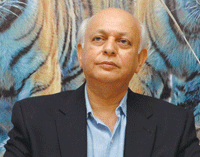 Hemendra Kothari, promoter-chairman of the Hemendra Kothari Foundation (estb. 2008), a Mumbai-based philanthropic organisation focused on wildlife conservation, education and health. A former Bombay Stock Exchange heavyweight (D.S Purbhoodas & Co) and former chairman of DSP Merrill Lynch, Kothari sold his interest in the firm to Merrill Lynch and the Bank of America for over $500 million in the period 2005-09. Currently he chairs DSP Blackrock Investment Managers Pvt. Ltd, a private equity and mutual funds firm which manages assets of over Rs.41,000 crore.
Hemendra Kothari, promoter-chairman of the Hemendra Kothari Foundation (estb. 2008), a Mumbai-based philanthropic organisation focused on wildlife conservation, education and health. A former Bombay Stock Exchange heavyweight (D.S Purbhoodas & Co) and former chairman of DSP Merrill Lynch, Kothari sold his interest in the firm to Merrill Lynch and the Bank of America for over $500 million in the period 2005-09. Currently he chairs DSP Blackrock Investment Managers Pvt. Ltd, a private equity and mutual funds firm which manages assets of over Rs.41,000 crore.
An enthusiastic and committed wildlife conservationist, Kothari promoted the eponymous foundation to reduce the dependence of tribal people residing in habitations abutting wildlife sanctuaries on thinning and depleting forests.
Currently HKF supports NGOs working with over 100 schools sited near the Ranthambhore, Pench, Tadoba, Andhari and Mudhumalai tiger reserves, educating and upskilling children to prepare them for employment in non-traditional occupations. Moreover, HKF supports 21 schools run by the Nashik Education Society with an aggregate enrolment of 27,000 students. “We hope to favourably impact and upgrade neglected communities living near forests. This will stablilise the fragile environments in which tiger reserves and sanctuaries are located,” says Kothari.
Navneet architects
Amarchand, Dungarshi, Harakchand, Shanti & Jitendra Gala, promoter-directors of Navneet Publications (India) Ltd (estb. 1959). A low-profile Mumbai-based school textbooks publishing company, Navneet has established an excellent reputation over the past half century. Currently the company which commissions, prints and publishes textbooks mapped with the syllabuses of the state examination boards of Maharashtra and Gujarat, has more than 5,000 educational, preschool and general titles in print.
The company’s high-quality textbooks are prescribed by 25,000 nurseries, primary and secondary schools reaching over 30 million students in the country’s premier industrial states. With 2,800 employees on its muster roll, Navneet Publications (annual revenue: Rs.610 crore) is the sole textbooks publishing company listed on the Bombay Stock Exchange.
In 2008, it entered the digital learning space and currently its digitised texts — marketed under the brand eSense — are being prescribed in 925 primary-secondaries in Maharashtra and Gujarat. Moreover the company has also diversified its operations to enter the schools management and brick-n-mortar preschools businesses. Currently Navneet provides management services and advice to over 80 schools in Andhra Pradesh, and has promoted three preschools in Mumbai and one in Pune under the Leapbridge brand name.
Reformist CBSE chief
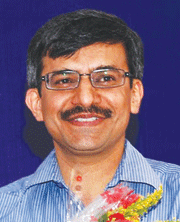 Vineet Joshi, chairman, Central Board of Secondary Education (CBSE). An alumnus of IIT Kanpur and IIFT Delhi and an IAS officer of the 1992-batch, Joshi was appointed pro tem chairman in 2008 and chairman of CBSE — the country’s largest pan-India school leaving examination board with 12,250 schools in India and overseas including 141 in 21 countries affiliated with it — in February 2010.
Vineet Joshi, chairman, Central Board of Secondary Education (CBSE). An alumnus of IIT Kanpur and IIFT Delhi and an IAS officer of the 1992-batch, Joshi was appointed pro tem chairman in 2008 and chairman of CBSE — the country’s largest pan-India school leaving examination board with 12,250 schools in India and overseas including 141 in 21 countries affiliated with it — in February 2010.
Since then during the past few years he has introduced several path-breaking curriculum and examination reforms in CBSE affiliated schools. Among them: introduction of the CCE (continuous and comprehensive evaluation) system; making the class X board exam optional for higher secondary school students; introducing in-school formative and summative assessment systems, and mandating evaluation of co-curricular skills (attitudes and values, literary, creative and scientific skills, aesthetic sensibilities and performing arts).
Moreover the curricula of CBSE schools has been enriched through the introduction of vocational education in secondary school, and optionals such as mass media studies, design, hospitality management, healthcare sciences and financial market management for higher secondary students.
Joshi is also credited for streamlining CBSE’s affiliation process by introducing online affiliation for schools and the launch of CBSE’s contemporary and information-rich website www.cbseacademic.in last month (May).
Exemplary soldier educationist
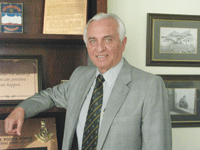 Lt. Gen (Retd). Arjun Ray, VSM, PVSM, chief executive of the Indus Trust (estb. 2003) and Indus International Schools (Bangalore, Hyderabad and Pune). An alumnus of the Staff College, Camberley, UK, and the National Defence College, New Delhi, Ray served the Indian Army with distinction for 38 years before he retired in 2002. In his last assignment before retirement, he commanded the newly raised 14 Corps in Ladakh where to win the hearts and minds of the people and ward off the threat of insurgency in this sensitive border area, he conceptualised the education-driven Operation Sadbhavna (goodwill). Under this programme, he promoted 13 primary schools, 11 women’s empowerment and 60 adult education centres along the line of control in Jammu and Kashmir.
Lt. Gen (Retd). Arjun Ray, VSM, PVSM, chief executive of the Indus Trust (estb. 2003) and Indus International Schools (Bangalore, Hyderabad and Pune). An alumnus of the Staff College, Camberley, UK, and the National Defence College, New Delhi, Ray served the Indian Army with distinction for 38 years before he retired in 2002. In his last assignment before retirement, he commanded the newly raised 14 Corps in Ladakh where to win the hearts and minds of the people and ward off the threat of insurgency in this sensitive border area, he conceptualised the education-driven Operation Sadbhavna (goodwill). Under this programme, he promoted 13 primary schools, 11 women’s empowerment and 60 adult education centres along the line of control in Jammu and Kashmir.
Gen. Ray’s initiatives in education which were widely acclaimed in India and abroad, attracted the interest of Kumar Malavalli, a Silicon Valley (USA)-based IT tycoon of Indian origin, who invited him to promote the high-end, IBO-affiliated Indus International School, Bangalore (IIS-B) under the aegis of the Indus Trust. IIS-B was not only constructed in record time but over the past seven years has quickly established a global reputation as an excellent IB K-XII academy. In the EW-C fore India’s Most Respected Schools Survey 2011, IIS-B was ranked the country’s second most respected international school behind Woodstock, Mussoorie (estb. 1852). Since then, the trust has promoted Indus International schools in Pune and Hyderabad with the three schools boasting an aggregate enrolment of 1,700 students from over 50 countries around the world. Moreover, in an exceptional initiative, the trust has promoted a parallel free school on the Indus International, Bangalore campus which offers the IB primary years curriculum to over 300 children.
Child rights champion
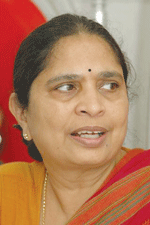 Dr. Shantha Sinha, chairperson National Commission for Protection of Child Rights (NCPCR). Well-known in NGO circles as founder of the MV Foundation, which has rehabilitated over 400,000 child workers by enroling them in schools, Sinha was appointed the first chairperson of NCPCR in 2007.
Dr. Shantha Sinha, chairperson National Commission for Protection of Child Rights (NCPCR). Well-known in NGO circles as founder of the MV Foundation, which has rehabilitated over 400,000 child workers by enroling them in schools, Sinha was appointed the first chairperson of NCPCR in 2007.
Established in March 2007 as a statutory body under the Commissions for Protection of Child Rights Act, 2005, NCPCR’s broad mandate is to protect, promote and defend child rights countrywide. It has been vested with powers of a civil court to inquire into complaints and take suo motu notice of matters related to deprivation and violation of child rights. NCPCR is also the apex level monitoring authority of the Right to Education Act, 2009, and set up an RTE division in February 2010 to receive and address complaints of denial of the fundamental right to elementary education.
Recipient of the Padma Shri and Ramon Magsaysay awards, Sinha has used her two decades of experience as a child rights activist to create nationwide awareness of children’s rights and societal obligations towards them, initiating interaction with state governments, corporates, and NGOs to gather support for children’s causes.
DPS Society chairman
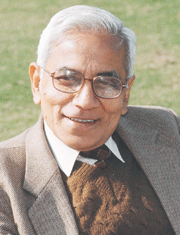 Ashok Chandra, chairman of Delhi Public School (DPS) Society. An alumnus of Allahabad University who was inducted into the IAS in 1959, Chandra served as secretary to the government of India in the ministries of oil and petroleum, heavy industry, information and broadcasting. After retirement, he was elected chairman of the DPS Society in 2006 and re-elected in 2010. During his six-year tenure, Kumar has metamorphosed into the driving force of DPS Society which runs 140 Delhi Public Schools (including 11 society-owned schools) with an aggregate enrolment of 275,000 students instructed by 10,000 teachers in India and abroad.
Ashok Chandra, chairman of Delhi Public School (DPS) Society. An alumnus of Allahabad University who was inducted into the IAS in 1959, Chandra served as secretary to the government of India in the ministries of oil and petroleum, heavy industry, information and broadcasting. After retirement, he was elected chairman of the DPS Society in 2006 and re-elected in 2010. During his six-year tenure, Kumar has metamorphosed into the driving force of DPS Society which runs 140 Delhi Public Schools (including 11 society-owned schools) with an aggregate enrolment of 275,000 students instructed by 10,000 teachers in India and abroad.
Run on the franchise model with the owned schools testing and prescribing minimum infrastructure norms and curriculum, DPS schools have established an excellent national reputation for delivering standardised secondary education of high quality, much appreciated by India’s rising new middle class. Indeed the DPS model has proved so popular that DPS schools have been established as far afield as Singapore, Thailand, Malaysia and several Middle East countries.
The excellent reputation of DPS schools is testified by the inclusion of 19 DPS primary-secondaries headed by DPS, R.K. Puram, Delhi in the EW-C fore India’s Most Respected Schools Survey 2011 league table. Currently 300 affiliation applications from educators are pending consideration of the DPS Society.
Influential NUEPA chief
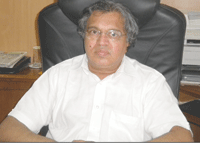 Dr. R. Govinda, vice chancellor of National University of Educational Planning and Administration (NUEPA), New Delhi. A former professor of the Institute of Education, University of London, M.S. University, Baroda and International Institute of Educational Planning, UNESCO, Govinda was appointed vice chancellor of the country’s premier education university in 2010.
Dr. R. Govinda, vice chancellor of National University of Educational Planning and Administration (NUEPA), New Delhi. A former professor of the Institute of Education, University of London, M.S. University, Baroda and International Institute of Educational Planning, UNESCO, Govinda was appointed vice chancellor of the country’s premier education university in 2010.
Promoted by Unesco in 1962 as the Asian Regional Centre for Educational Planners and Administration, it was taken over by the Union government in 1970 and renamed the National Staff College for Education Planners and Administration. In 1979 the college was again renamed NIEPA and upgraded into a national university in 2006. Today NUEPA’s role is to provide professional services to the Union government on capacity building in education, policy planning, management, research, training and consultancy. In 1995 this institution devised a unique software program christened DISE (District Information System), with which it has been conducting detailed, in-depth surveys of primary education infrastructure, enrolment and related information, in 605 districts countrywide. This massive data gathering exercise is contained in a data-rich and valuable annual report — Elementary Education in India (EEI). Published by NUEPA, EEI offers an accurate picture of the condition of primary and upper primary education in India.
With its annual EEI reports well-established, NUEPA has launched two new ambitious projects — All India Survey of Higher Education to collect reliable data on all public and private institutions of higher education, and Secondary Management Information System to gather data on all secondary schools countrywide. Moreover, as member of the Central Advisory Board of Education (CABE) and the National Advisory Committee on Right to Education of the government of India, Govinda is an influential proponent of reforms in primary and higher education.
Primary education innovator
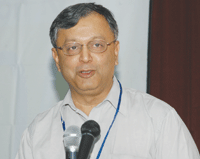 Madhav Chavan, promoter-chief executive of Pratham. A chemistry alumnus of Ohio State University, USA and former reader in physical chemistry at Mumbai University, in 1989 Chavan switched tracks to enter the primary education sector and co-promoted Pratham — an NGO committed to universalising and upgrading elementary education in India — in 1994. Since then Pratham has emerged as the largest education NGO countrywide with an annual budget of Rs.75 crore. Operational in 17 states, Pratham has reached over 30 million children through its supplementary and remedial reading and basic maths programmes.
Madhav Chavan, promoter-chief executive of Pratham. A chemistry alumnus of Ohio State University, USA and former reader in physical chemistry at Mumbai University, in 1989 Chavan switched tracks to enter the primary education sector and co-promoted Pratham — an NGO committed to universalising and upgrading elementary education in India — in 1994. Since then Pratham has emerged as the largest education NGO countrywide with an annual budget of Rs.75 crore. Operational in 17 states, Pratham has reached over 30 million children through its supplementary and remedial reading and basic maths programmes.
Also active in teacher training, curriculum development and education research, since 2005 Pratham has been publishing its Annual Status of Education Report (ASER) which assesses actual learning outcomes in rural (mainly government) primary schools countrywide. This much acclaimed independent audit of government primaries is conducted by 20,000 ASER volunteers — mainly college students — who fan out into 558 of the country’s 630 districts. ASER 2011 reveals that the quality of primary education dispensed in rural India has been steadily deteriorating with over 48.2 percent of children in class V unable to read and comprehend class II texts and 61 percent unable to solve simple two-digit subtraction sums.
Sports education champion
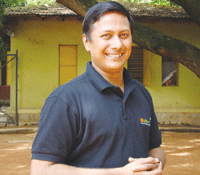 Saumil Majmudar, co-founder and chief executive of Edusports Pvt. Ltd, Bangalore. An alumnus of IIT-Bombay and IIM-Bangalore, Majmudar began his professional career with the IT major Wipro (research and development) in 1995. In 1998 he went solo and started Learn@Home — a personalised computer training business. A year later, he promoted QSupport — among the first remote tech support businesses out of India.
Saumil Majmudar, co-founder and chief executive of Edusports Pvt. Ltd, Bangalore. An alumnus of IIT-Bombay and IIM-Bangalore, Majmudar began his professional career with the IT major Wipro (research and development) in 1995. In 1998 he went solo and started Learn@Home — a personalised computer training business. A year later, he promoted QSupport — among the first remote tech support businesses out of India.
In 2003 this never-say-die entrepreneur promoted SportzVillage, a firm providing fitness, football and athletics training on a sports field rented in suburban Bangalore. Since then, SportzVillage has morphed into SportzConsult (sports management) and EduSports Pvt. Ltd (estb.2009) which raised venture capital of Rs.4.5 crore in 2010. “EduSports was promoted to create a generation of ‘champions in life’ — healthier and fitter children equipped with key life-skills — all through the magic of sports,” says Majmudar.
And even if belatedly, the parents, educators and teachers communities seem to be heeding Majmudar’s message of the vital importance of sports education. The number of client schools in which the company’s fitness training and sports education programmes are mandatory, has risen to 200 with over 150,000 children experiencing the magic of sports under the per student per month (fees: Rs.100-150) business model.
Teach for India motivator
 Shaheen Mistri, founder CEO of Teach For India. An alumna of Mumbai and Manchester universities, Mistri is also founder of the Akanksha Foundation (estb.1991), which offers supplementary education to 3,500 underprivileged children in Mumbai and Pune. In 2008, Mistri accepted an offer to spearhead Teach for India, an initiative of Teach to Lead, a Mumbai-based NGO.
Shaheen Mistri, founder CEO of Teach For India. An alumna of Mumbai and Manchester universities, Mistri is also founder of the Akanksha Foundation (estb.1991), which offers supplementary education to 3,500 underprivileged children in Mumbai and Pune. In 2008, Mistri accepted an offer to spearhead Teach for India, an initiative of Teach to Lead, a Mumbai-based NGO.
Modelled on the highly successful Teach for America programme founded by Wendy Kopp in 1989, Teach For India is a high-potential initiative under which outstanding college graduates and professionals commit two years to teach full-time in under-resourced low-income schools in an effort to end “inequity in education”. Over the past three years Teach For India has placed 370 fellows (paid a monthly stipend of Rs.15,000 plus housing allowance) in 122 schools in Mumbai, Pune and Delhi.
An inspiring educator, through Teach For India Mistri has motivated some of India’s brightest college graduates and professionals to volunteer to spend two years in under-resourced classrooms, and committ to bridging the gap in school education.
Affordable schools promoter
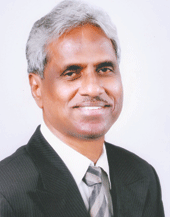 M. Venkata Narayana is the Hyderabad-based chairman of Gowtham Model Schools (GMS) and K-12 Techno Services Pvt. Ltd, which offers education consultancy services. Promoted in 2002 with the mandate to offer affordable quality education, the Hyderabad-based GMS chain has lengthened rapidly. Currently it comprises 70 K-10 schools with an aggregate enrolment of 50,000 students and 3,000 teachers in 48 towns and cities in the southern state of Andhra Pradesh (pop. 84 million).
M. Venkata Narayana is the Hyderabad-based chairman of Gowtham Model Schools (GMS) and K-12 Techno Services Pvt. Ltd, which offers education consultancy services. Promoted in 2002 with the mandate to offer affordable quality education, the Hyderabad-based GMS chain has lengthened rapidly. Currently it comprises 70 K-10 schools with an aggregate enrolment of 50,000 students and 3,000 teachers in 48 towns and cities in the southern state of Andhra Pradesh (pop. 84 million).
Affiliated with the Andhra Pradesh state exam board, all Gowtham Model Schools offer technology-enabled English-medium K-10 education on contemporary campuses at affordable prices. Now the group, which also runs ten junior (classes XI-XII) colleges and the well-reputed CBSE-affiliated Orchid International School, Hyderabad, is going national with a target of promoting 250 greenfield schools in Madhya Pradesh, Maharashtra, Gujarat and Rajasthan.
The distinguishing feature of GMS is that they offer high-quality technology-enabled education at affordable tuition fees of Rs.1,000-1,500 per month, catering to the huge demand from parents for affordably priced English-medium K-10 education. In the process, Venkata Narayana has made English-medium school education accessible to over 30,000 aspirational households in Andhra Pradesh.
World’s largest open school chief
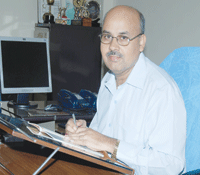 Sitansu S. Jena, chairman National Institute of Open Schooling (NIOS). An alumnus of Kurukshetra University awarded a Ph D in education from the Institute of Social and Economic Change, Bangalore, Jena served with the Indira Gandhi National Open University (IGNOU) for over two decades before being appointed chairman of NIOS in 2009.
Sitansu S. Jena, chairman National Institute of Open Schooling (NIOS). An alumnus of Kurukshetra University awarded a Ph D in education from the Institute of Social and Economic Change, Bangalore, Jena served with the Indira Gandhi National Open University (IGNOU) for over two decades before being appointed chairman of NIOS in 2009.
Established by the Central government in 1989, with the stated objective of “providing education to those who are unable to attend school for a variety of socio-economic reasons and meeting the educational needs of differently abled children for creating an inclusive education system”, NIOS has played a critical role in providing a second chance to school dropouts, challenged children and adults to access, resume and continue secondary education. Over the past 23 years, NIOS has tutored and certified 1.28 million students aged 14 years-plus as class X school-leavers; 1.03 million senior secondary (class XII) students and provided 150,000 with vocational education and training. Currently an estimated 2.02 million students are enroled in its secondary, senior secondary, and vocational education distance learning programmes supported by 3,994 accredited institutions countrywide.
Since taking charge of the world’s largest open school, Jena has taken important steps to raise public awareness and acceptability of certification awarded by this low-profile institute/examination board. High on his agenda is revision of the NIOS curriculum, integration of ICT and online technologies to improve learning outcomes, and introduction of industry relevant VET and adult education programmes.
English-medium missionary
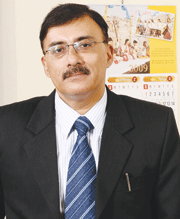 Deepak Madhok, chairman of the Varanasi-based Sunbeam Group of educational institutions (estb.1972) comprising 13 CBSE-affiliated schools with an aggregate enrolment of 20,000 students and 2,000 faculty. Sunbeam School, Lahartara was ranked Varanasi’s No. 1 day school and among the top five in Uttar Pradesh —India’s most populous state — in the EducationWorld-C fore India’s Most Respected Schools Survey 2011.
Deepak Madhok, chairman of the Varanasi-based Sunbeam Group of educational institutions (estb.1972) comprising 13 CBSE-affiliated schools with an aggregate enrolment of 20,000 students and 2,000 faculty. Sunbeam School, Lahartara was ranked Varanasi’s No. 1 day school and among the top five in Uttar Pradesh —India’s most populous state — in the EducationWorld-C fore India’s Most Respected Schools Survey 2011.
The seeds of the Sunbeam Group were planted four decades ago by Dr. Amrit Lal Madhok and Deesh Madhok who promoted the first Sunbeam School in the Bhagwanpur area of the holy city of Varanasi. In 1990, their son Deepak, an alumnus of Benaras Hindu and Allahabad universities, then a civic administrator in the Uttar Pradesh Public Service Commission, took the hard decision of quitting the civil service to help his parents realise their mission of “providing world-class English-medium education to the children of Uttar Pradesh”. Since then, Deepak has transformed the Sunbeam Group into one of UP’s fastest growing school chains by promoting schools in Annapurna (1996), Lahartara (2002), Varuna (2002) — all in Varanasi — and Mughalsarai (2004). In April last year, four new CBSE-affiliated Sunbeam K-12 schools sited in the cities of Jaunpur, Allahabad, Ghazipur and Mau — across the Hindi heartland state of Uttar Pradesh — admitted their first batches of students.
Madhok’s special achievement is that in the educationally backward and lawless state of Uttar Pradesh, he has nurtured an excellent group of education institutions providing children with high-quality English-medium education, knowledge and skills.
Rural science education pioneer
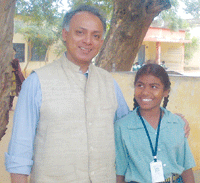 Ramji Raghavan, founder-chairman Agastya International Foundation, Bangalore. An alumnus of Delhi University and the London Business School, Raghavan threw up a promising 20-year, London-based career in banking and finance (Citibank and Cedel) to return to India to promote Agastya — an NGO focused on providing hands-on science and technology education to rural children — in 1999.
Ramji Raghavan, founder-chairman Agastya International Foundation, Bangalore. An alumnus of Delhi University and the London Business School, Raghavan threw up a promising 20-year, London-based career in banking and finance (Citibank and Cedel) to return to India to promote Agastya — an NGO focused on providing hands-on science and technology education to rural children — in 1999.
Agastya’s first initiative — a unique, state-of-the-art science education centre for rural children set in a 172-acre campus in Kuppam, Andhra Pradesh — became operational in 2000. Now this unprecedented Rs.30-crore facility provides hands-on physics, chemistry, biology and maths learning to over 500 class III-X children and 40 teachers from government schools in neighbouring villages and districts who are bussed in daily to the campus. Over the past 13 years since it was promoted by a group of educationists and scientists led by Raghavan, Agastya (budget: Rs.12 crore in 2010-11) has reached 5 million children and 150,000 teachers (mainly from rural government schools) in ten states countrywide.
Every day, in a rare feat of organisational efficiency and management, 259 Agastya teacher-instructors disseminate hands-on science education to over 4,800 children from government schools in ten states through its major science centre in Kuppam, 28 satellite science centres, 61 mobile science vans, and science fairs. In the process, Agastya has engineered a scalable model for sparking a belated science education revolution in rural India.
Symbiosis Group inheritor
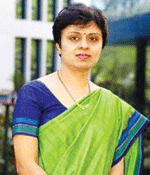 Dr. Vidya Yeravdekar, principal-director Symbiosis Society which manages 37 education institutions including the Symbiosis International University, Pune. Founded by her father the legendary Dr. S.B. Mujumdar in 1971, the Symbiosis Group now comprises 37 education institutions spread across 19 campuses with an aggregate enrolment of 27,000 students. In 2001, Yeravdekar at her father’s invitation took charge as joint director and later principal-director of the society, and manages all day-to-day operations and expansion initiatives of the group.
Dr. Vidya Yeravdekar, principal-director Symbiosis Society which manages 37 education institutions including the Symbiosis International University, Pune. Founded by her father the legendary Dr. S.B. Mujumdar in 1971, the Symbiosis Group now comprises 37 education institutions spread across 19 campuses with an aggregate enrolment of 27,000 students. In 2001, Yeravdekar at her father’s invitation took charge as joint director and later principal-director of the society, and manages all day-to-day operations and expansion initiatives of the group.
With the society’s showpiece Symbiosis International University having established a national reputation for academic excellence, under Yeravdekar’s leadership over the past decade the Symbiosis Group has expanded rapidly promoting a campus in Dubai and acquiring 300 acres of land in Pune to construct a Symbiosis Knowledge Village.
New AICTE helmsman
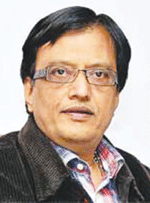 Dr. S. S. Mantha, chairman, All India Council for Technical Education (AICTE). A former professor of mechanical engineering at VJTI, Mumbai and hitherto pro vice chancellor of SNDT Women’s University, Mantha was appointed vice chairman of AICTE in 2009. Following the unceremonious exit of former chairman R.A. Yadav who was suspended by the Union HRD ministry on corruption charges, Mantha was elevated to the position of chairman in January this year.
Dr. S. S. Mantha, chairman, All India Council for Technical Education (AICTE). A former professor of mechanical engineering at VJTI, Mumbai and hitherto pro vice chancellor of SNDT Women’s University, Mantha was appointed vice chairman of AICTE in 2009. Following the unceremonious exit of former chairman R.A. Yadav who was suspended by the Union HRD ministry on corruption charges, Mantha was elevated to the position of chairman in January this year.
Established in 1945, through its subsidiary the National Board of Accreditation, AICTE supervises, regulates and accredits engineering and technical, business management, pharmacoepial, nursing, hotel management, etc, education in India. All major engineering, pharmacy colleges and B-schools need to be ‘recognised’ by AICTE and accredited by NBA, prominent exceptions being the IITs.
A highly-respected academic and administrator, Mantha has lost no time and has begun a much-needed clean-up drive to infuse transparency and accountability into the council’s administration and accreditation processes. To restore the faith of stakeholders in AICTE, he intends to strengthen the council’s e-governance initiatives, streamline the process of recognition/accreditation of new colleges and programmes, and provide comprehensive statistics on technical education in the country. Dr. Mantha is also helping prepare a National Vocational Education Qualification framework.
Vocational education spearhead
 Dilip Chenoy, managing director National Skills Development Corporation (NSDC). An alumnus of Delhi University and former director general of the Society of Indian Automobile Manufacturers and deputy director general of the Confederation of Indian Industry (CII), Chenoy took charge of NSDC in May last year.
Dilip Chenoy, managing director National Skills Development Corporation (NSDC). An alumnus of Delhi University and former director general of the Society of Indian Automobile Manufacturers and deputy director general of the Confederation of Indian Industry (CII), Chenoy took charge of NSDC in May last year.
Promoted by the Union government and several representative associations of industry including CII, FICCI and Assocham, NSDC is a first-of-its-type PPP (public-private partnership) not-for-profit organisation to stimulate skills development education countrywide. Established in October 2009 with a corpus of Rs.1,000 crore, of which 51 percent is contributed by the private sector, NSDC’s mandate is to fund competent education entrepreneurs and NGOs to establish vocational education and training (VET) centres across the country.
In the past one year, NSDC has approved 28 VET proposals of private entrepreneurs with an aggregate outlay of Rs.668 crore. This year it has targeted approval of 32 new proposals which will train between 15-20 million people over ten years. Committed to encouraging private sector initiatives in VET, Chenoy has used his organisational management experience to get this high-potential initiative off to a good start by speedily clearing funding proposals.
RTE Act monitor
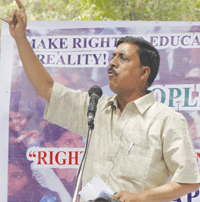 Ambarish Rai, convener Right to Education (RTE) Forum, a coalition of over 10,000 NGOs including NAFRE, Save the Children, Campaign against Child Labour, Unicef, Oxfam-India, National Coalition for Education, among others.
Ambarish Rai, convener Right to Education (RTE) Forum, a coalition of over 10,000 NGOs including NAFRE, Save the Children, Campaign against Child Labour, Unicef, Oxfam-India, National Coalition for Education, among others.
Since the Right to Free and Compulsory Education (RTE) Act, 2009 came into force on April 1, 2010, the RTE Forum has presented an annual report to the nation on the implementation status of the Act countrywide. The RTE Forum’s latest stocktaking report released on April 3 this year, reveals that a staggering 95.2 percent of schools are non-compliant with infrastructure norms specified by the Schedule of the Act; 93 percent of teacher candidates failed the National Teacher Eligibility Test conducted by CBSE; 36 percent of sanctioned teaching posts are vacant; 99.68 percent children reported one or more types of punishment in school; and that the Central and state governments failed to spend 30 percent of the funds allocated for Sarva Shiksha Abhiyan (SSA)/RTE in 2010-11.
Also convener of the Peoples’ Campaign for a Common School System, Rai has coalesced over 10,000 child rights and education NGOs under the banner of the RTE Forum to transform into a pressure group for effective implementation of the RTE Act and force the Central and state governments to fulfil the promise of providing free and compulsory education to all children in the six-14 age group countrywide.
Educator extraordinaire
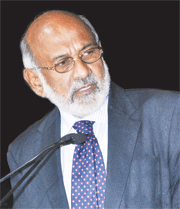 Shomie Das, education consultant and chairman of the Hyderabad-based People Combine Educational Initiatives Pvt. Ltd (estb. 2009), an education services company. A physics alumnus of Calcutta and Cambridge universities, Das has over three decades of experience of heading a clutch of India’s top-ranked legacy boarding schools. A former physics tutor to Prince Charles at the Gordonstoun School, Scotland, Das served as headmaster of Mayo College (1969-1974), Lawrence School, Sanawar (1974-1988) and his alma mater Doon School (1988-1995).
Shomie Das, education consultant and chairman of the Hyderabad-based People Combine Educational Initiatives Pvt. Ltd (estb. 2009), an education services company. A physics alumnus of Calcutta and Cambridge universities, Das has over three decades of experience of heading a clutch of India’s top-ranked legacy boarding schools. A former physics tutor to Prince Charles at the Gordonstoun School, Scotland, Das served as headmaster of Mayo College (1969-1974), Lawrence School, Sanawar (1974-1988) and his alma mater Doon School (1988-1995).
Post 1995 in his avatar as an education consultant, Das has planned the growth and development of 64 highly-reputed private schools including the Scottish High International and G. D. Goenka, Gurgaon; Ahlcon International, Delhi and Heritage School, Kolkata. Moreover as chairman of People Combine Educational Initiatives, he has supervised the promotion of five Oakridge schools in four cities. A much sought-after education consultant in India and abroad, respected for his years of experience and innovative ideas, Das has made an extraordinary contribution to the development of India’s world class private school education system.
Model schools commissioner
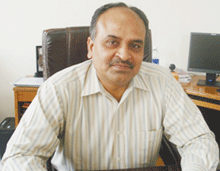 Avinash Dikshit, commissioner Kendriya Vidyalaya Sangathan (KVS), which administers 1,087 Kendriya Vidyalaya (KV) schools with an aggregate enrolment of 1.05 million students countrywide. An IIT-Kanpur graduate and a 1986 batch IDAS (Indian Defence Accounts Service) officer, Dikshit took charge as commissioner of KVS in 2010 following postings in Rwanda and Uttar Pradesh.
Avinash Dikshit, commissioner Kendriya Vidyalaya Sangathan (KVS), which administers 1,087 Kendriya Vidyalaya (KV) schools with an aggregate enrolment of 1.05 million students countrywide. An IIT-Kanpur graduate and a 1986 batch IDAS (Indian Defence Accounts Service) officer, Dikshit took charge as commissioner of KVS in 2010 following postings in Rwanda and Uttar Pradesh.
Promoted by the Central government as primary-secondaries for its employees, KVs have since emerged as model government schools with a reputation for academic excellence. Undoubtedly since the first 20 KVs were established in 1962-63, these Central government-funded schools have established a brand reputation on a par with the Central government promoted IITs and IIMs. Little wonder the approach paper to the Eleventh Plan (2007-12) officially called upon state governments to adopt KVs as the model for government schools countrywide to emulate.
Professional sports educator
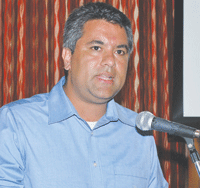 Dev Roy, founder-managing director, FitKids Education and Training Pvt. Ltd, Bangalore. A graduate of R.V. College of Engineering, Bangalore with an MBA from the University of Chicago, Roy began his career with IBM, USA in 1995 followed by stints in the Bank of America, Dresdner Bank and Barclays Capital. However in 2009, he took a leap of faith to return to India and promote FitKids Education with the objective of delivering high-quality sports education to children and youth.
Dev Roy, founder-managing director, FitKids Education and Training Pvt. Ltd, Bangalore. A graduate of R.V. College of Engineering, Bangalore with an MBA from the University of Chicago, Roy began his career with IBM, USA in 1995 followed by stints in the Bank of America, Dresdner Bank and Barclays Capital. However in 2009, he took a leap of faith to return to India and promote FitKids Education with the objective of delivering high-quality sports education to children and youth.
In December 2009 FitKids Education launched its Leapstart programme for K-class XII children. Leapstart is an age-appropriate sports and physical fitness training programme for children to develop basic athletics and motor skills, designed in partnership with SPARK (Sports, Play and Active Recreation for Kids), a US-based research and public health organisation whose sports curriculum is being implemented in over 10,000 schools in 30 countries worldwide. Currently FitKids offers a menu of over 4,000 activities and games delivered by 300 full-time physical education professionals to over 60,000 students enroled in 100 schools in India and abroad.
By adapting and introducing SPARK’s intensively-researched fitness and sports education programme in K-12 education in India, Roy has infused professionalism and expertise into ritual and arbitrary sports education dispensed in India’s schools system.
Inclusive education proponent
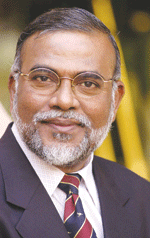 Dr. Narendra Jadhav, member Planning Commission. A highly-respected educationist, economist and policy maker, Dr. Jadhav’s sectoral responsibilities within the commission include education, labour, employment, skills development, sports and youth affairs, and social justice and empowerment.
Dr. Narendra Jadhav, member Planning Commission. A highly-respected educationist, economist and policy maker, Dr. Jadhav’s sectoral responsibilities within the commission include education, labour, employment, skills development, sports and youth affairs, and social justice and empowerment.
After having served with the Reserve Bank of India for over 31 years, in 2006 Dr. Jadhav was appointed vice chancellor of the University of Pune (UoP) — the largest university in the world with 612 affiliated colleges and 650,000 students. Within three years, under his leadership, UoP transformed into a favoured destination of foreign students with 45 percent of all foreign students in India enroled at UoP. A bestselling author whose autobiography Untouchables has sold over 400,000 copies, he is acknowledged as a Dalit icon who champions the cause of high-quality education opportunities and reservation in education institutions for India’s 166 million historically neglected Dalit population.
Also a member of the National Advisory Council chaired by Sonia Gandhi and of several Central government higher education committees, Dr. Jadhav is an influential voice in national education policy formulation.


























